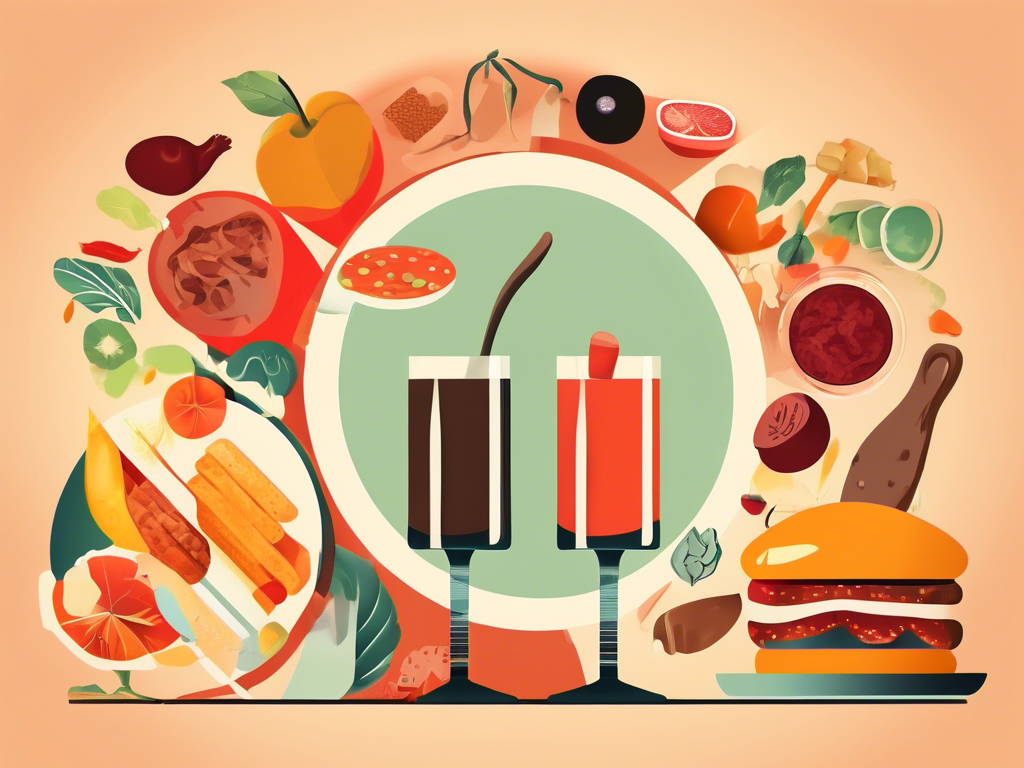The Bottom Line:
- Alcohol can damage liver cells and weaken natural defenses over time.
- Sugary foods can lead to fatty liver disease if consumed excessively.
- Fried and fast foods high in unhealthy fats can cause liver damage and obesity.
- Excessive consumption of red meat can contribute to liver damage over time.
- Excessive salt intake can lead to fluid buildup in the liver and liver disease.
Alcohol: The Impact on Liver Health
Alcohol: The Impact on Liver Health
Alcohol consumption can have a significant impact on liver health beyond what might be immediately obvious. When alcohol is consumed, the liver works to break it down and eliminate it from the blood. However, this process can result in the generation of harmful byproducts that can damage liver cells, trigger inflammation, and compromise the body’s natural defenses.
Over time, excessive alcohol consumption can lead to chronic liver disease, including cirrhosis, a condition characterized by scarring of the liver that impairs its function. Additionally, alcoholic hepatitis, marked by liver inflammation, can also develop. While occasional consumption may not pose a risk, continuous excessive drinking can have severe consequences on liver health.
Sugary Foods and Liver Health
Our love for sugary treats may have unintended consequences on liver health. The liver’s role in converting sugar into fat can become overwhelmed when regularly indulging in sweets, leading to the accumulation of excessive fat in the liver, a condition known as fatty liver disease. This buildup can cause inflammation and scarring, affecting the liver’s functionality over time.
Moderation is key when it comes to consuming sugary foods to reduce the burden on the liver. Swapping out high-sugar treats for healthier alternatives like fruits and monitoring overall sugar intake can help maintain liver health.
Fried and Fast Foods: Impacts on Liver Health
While fried and fast foods may be tempting, they can pose risks to liver health due to their high content of unhealthy fats and calories. Regular consumption of these foods can contribute to weight gain, obesity, and eventually non-alcoholic fatty liver disease (NAFLD). This condition arises when fat accumulates in the liver, leading to inflammation and damage.
Avoiding excessive intake of fried and fast foods in favor of nutrient-rich options can help support liver function and overall health. Prioritizing a balanced diet with adequate fiber and nutrients is essential for maintaining optimal liver health.
Sugary Foods and Fatty Liver Disease
Impact of Sugary Foods on Liver Health
Indulging in sugary treats can have unintended consequences on liver health. The liver’s role in converting sugar into fat can become overwhelmed with regular consumption of sweets, leading to the accumulation of excessive fat in the liver, known as fatty liver disease. This buildup can result in inflammation and scarring, impacting the liver’s functionality over time.
Strategies for Managing Sugary Foods Intake
Moderation is crucial when it comes to consuming sugary foods to reduce the burden on the liver. Swapping high-sugar treats for healthier alternatives like fruits and monitoring overall sugar intake can help maintain liver health. By making conscious choices and balancing indulgences with nutritious options, individuals can support their liver’s well-being.
Long-Term Effects of Fatty Liver Disease Due to Sugary Foods
Over time, continuous consumption of sugary foods can lead to severe conditions such as fatty liver disease, characterized by liver inflammation and scarring. It is essential to be mindful of sugar intake and prioritize a balanced diet to prevent the progression of liver damage. Making informed dietary decisions can significantly impact liver health and overall well-being.
Fried and Fast Foods: Risks to the Liver
Impact of Fried and Fast Foods on Liver Health
Indulging in fried and fast foods may satisfy your taste buds, but they can be detrimental to your liver health. These foods are typically high in unhealthy fats and calories, which can contribute to weight gain, obesity, and the development of non-alcoholic fatty liver disease (NAFLD). NAFLD occurs when fat accumulates in the liver, leading to inflammation and damage over time.
Role of Nutrient-Rich Alternatives in Liver Function
Avoiding excessive consumption of fried and fast foods in favor of nutrient-rich options is essential for supporting liver function and overall health. Opting for a balanced diet that includes adequate fiber and essential nutrients can help maintain optimal liver health and prevent the negative impacts associated with unhealthy food choices.
Recommended Dietary Strategies for Liver Well-Being
To promote liver well-being, it is crucial to prioritize a diet that prioritizes nutrient-dense foods over fried and fast options. Incorporating a variety of fruits, vegetables, lean proteins, and whole grains into your meals can provide the necessary nutrients to support liver function and mitigate the risks posed by consuming unhealthy foods like fried and fast foods.
Red Meat and Liver Damage
The Impact of Red Meat on Liver Health
While consuming red meat can be a tasty indulgence, it’s essential to exercise moderation. Red meat is high in saturated fats, which, when consumed excessively, can contribute to liver damage. Over time, this can lead to the development of non-alcoholic fatty liver disease, a condition that can go unnoticed until it progresses significantly and affects liver function.
Strategies for Managing Red Meat Consumption
It’s not necessary to completely eliminate red meat from your diet, but rather to strike a balance. Opt for leaner meats like chicken or turkey as alternatives to reduce the intake of saturated fats that can harm your liver. If you’re feeling adventurous, explore plant-based protein sources such as lentils, chickpeas, or tofu to diversify your protein intake and support liver health.
Salt: Balancing Intake for Liver Health
Salt and Liver Health
Salt plays a crucial role in our bodies, but excessive intake can have detrimental effects on liver health. Consuming too much salt can lead to fluid buildup in the liver, a condition known as ascites. This not only causes discomfort but can also progress to liver disease and even failure.
It’s important to be mindful of your salt intake, as it’s not just found in your salt shaker. Processed foods, canned goods, some beverages, and even certain medications can all contain hidden salt. Keeping an eye on these sources and opting for fresh, whole foods can help maintain a healthy balance in salt consumption.
Impact of Processed Foods on Liver Function
Processed foods are often packed with additives, artificial flavors, and trans fats that can overload the liver with toxins, leading to inflammation and liver disease. By opting for fresh, whole foods over prepackaged meals, you can reduce the burden on your liver and support its optimal function.
White Bread and Liver Health
White bread, a common household staple, may not be the best choice for liver health. High in refined carbohydrates, white bread can contribute to insulin resistance, which puts stress on the liver. Switching to whole grain bread, which offers more fiber and less sugar, can be a healthier alternative for supporting liver function.





